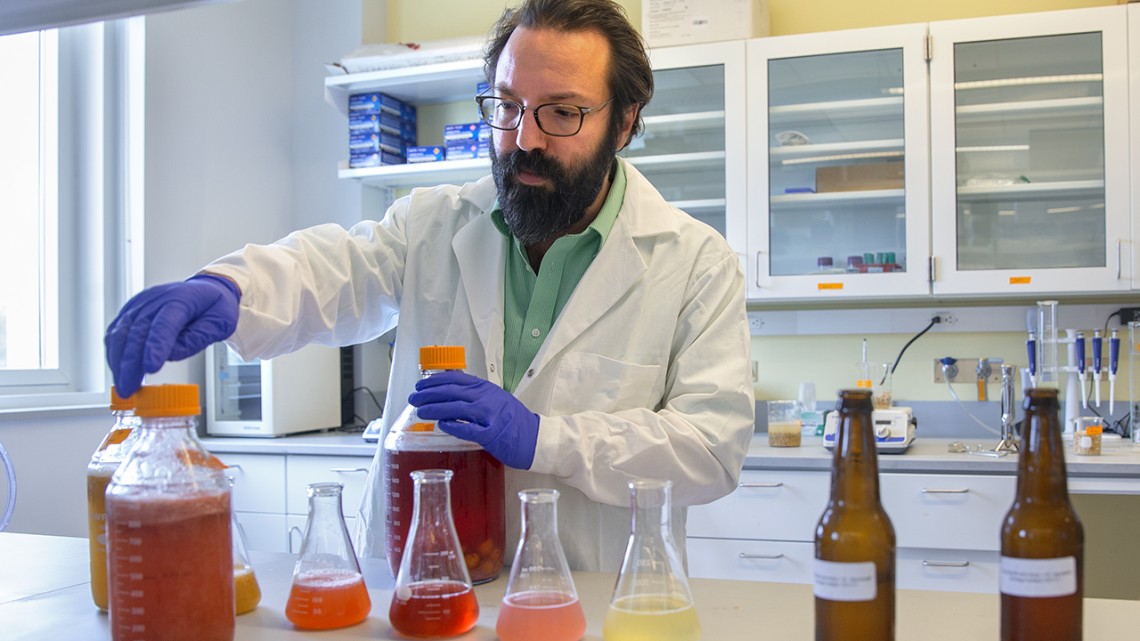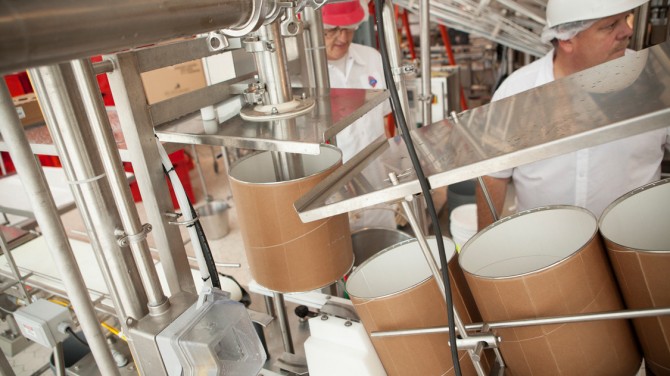
Sam Alcaine, assistant professor of food science, led the process of writing the text for the new Food Industry Resources for Coronavirus (COVID-19) website.
Cornell creates detailed COVID-19 website for food industry
By Blaine Friedlander
To keep New York’s food processing industry safe during the COVID-19 pandemic, Cornell’s Institute for Food Safety has created a comprehensive, practical and convenient website for commercial processors: Food Industry Resources for Coronavirus (COVID-19).
Coherent safety information for food processing plants in New York and other states can be difficult to find, said Sam Alcaine, assistant professor of food science, who led the writing of the descriptive text for the new website. Food processors need to figure out what is relevant for protecting the public and their own employees, and for helping to maintain a safe food supply for the U.S.
“Our goal with the COVID-19 resources website was to curate key information in one place,” Alcaine said, “and to provide access to Cornell faculty and experts for up-to-date industry-specific questions.”
The website’s guidance ranges from keeping a proper social distance and washing hands, to cleaning and disinfecting large food manufacturing facilities and food retail stores, as per direction from the state’s Department of Health and Department of Agriculture and Markets. The team has also collaborated with external groups, like the National Dairy Center network, to ensure food industry specific guidance is provided to minimize personnel risks due to COVID-19 illness, to protect employees and to maintain a functional and safe supply chain.
One important, frequently asked question on the site: Can COVID-19 be transmitted through the food we produce? Answer: There is no evidence suggesting that COVID-19 is transmitted through food consumption, according to the Centers for Disease Control and Prevention, the U.S. Food and Drug Administration, and the European Food Safety Agency.
Olga Padilla-Zakour, professor of food science and director of the Cornell Food Venture Center, said food industry processors must know where to find reliable information, especially during this crisis.
“We are trying to prevent miscommunication, misinformation and industry personnel not knowing what to do,” she said. “We want to make sure that food manufacturing is safe and following proper practices to mitigate any risks.”
“With good safety practices, we can manage and avoid the potential for unintended consequences,” said Martin Wiedmann, the Gellert Family Professor in Food Safety, and director of Cornell’s New York State Milk Quality Improvement Program.
He cited an example of a food worker wearing two gloves on one hand, when one glove will suffice. “We will quickly run out of gloves, when they could have been sent to a local hospital,” Wiedmann said. “The act is well-intentioned, but it causes unintended problems – making this COVID-19 situation harder to manage.”
In addition to Alcaine, Padilla-Zakour and Wiedmann, faculty and extension experts curating this website and offering to speak to food industry members include:
- Rob Ralyea, senior extension associate, and Kimberly Bukowski, extension professional, for dairy questions;
- Elizabeth Bihn, senior extension associate, and Michele Humiston, extension support specialist, for fresh produce;
- Randy Worobo, professor of food microbiology, for processed fruits and vegetables;
- Anna Katharine Mansfield, professor of enology, and Chris Gerling, senior extension associate, for fermented beverages; and
- Bruno Xavier, senior extension associate, for processed foods.
Keeping food industry processors from avoidable problems is key.
“Our main concern is for companies to know what to do when they find themselves in situations they don’t expect,” Padilla-Zakour said. “Commercial food processors should know that we – as food science faculty and experts – are available to provide science-based support.”
Media Contact
Get Cornell news delivered right to your inbox.
Subscribe


